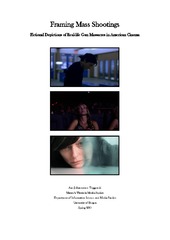| dc.description.abstract | This thesis examines the concept of real-life mass shootings and its depiction in American fictional cinema. The issue of mass shootings is a highly controversial subject of discussion, both within the public and political sphere, as it necessarily touches upon rigid perceptions of civil liberties – specifically those of the Second Amendment – which further permeates the field of fictional cinema. As opposed to assessing the issue of mass shootings as a product of a prevailing culture of guns, it is to a significant extent reduced to political leverage, a rhetorical weapon aimed to legitimize prevailing attitudes on a political battlefield on which opponents and supporters of one’s individual right to bear arms meet head to head. Moreover, it may be argued that there is a general reluctance to acknowledge the issue of mass shootings as a national concern, particularly when the foundation on which contemporary society is built will have to be scrutinized and examined from different angle. Certain traditional conceptions of the US as a nation may further distort the pathway towards efficiently and constructively deal with a widespread concern that is fundamentally American in nature; the prevailing mentality surrounding the issue of mass shootings thus leaves the idea of progress deadlocked. All things considered, newfound perspectives are necessary, and fictional cinema may prove to be of significant rhetorical value within this context, which constitutes the main argument of the thesis. As of today, the issue remains largely unseen on screen, particularly within the commercial sector, as Hollywood operates within relatively rigid traditional boundaries of expression, both in terms of ideological and financial structures – particularly when mass shootings are to be examined. Yet, attempts have been made within the independent sector. Certain filmmakers are unwilling to allow the acclamation of the second amendment of the Constitution fall in disfavor of the first; some step carefully around the elephant in the room, while others are willing to face it head on. In order to illuminate the sociopolitical value of fictional film and the ways in which aspects of the ongoing debate of mass shootings may be critically examined, Gus Van Sant’s 'Elephant', Lynne Ramsay’s 'We Need to Talk About Kevin' and Tim Sutton’s 'Dark Night' are analyzed. While Ramsay examines the concept of scrutiny and prejudice, Van Sant targets the distortedness of the discourse of mass shootings, and Sutton frames the issue of mass shootings as an inevitable downfall of the cultural status quo, in which guns are assigned the leading role. | en_US |
